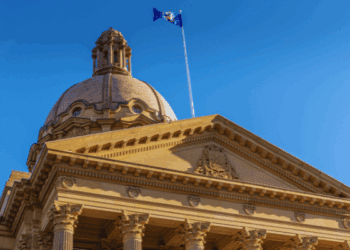September 22, 2012 – In a new column for the Calgary Herald, Vancouver Sun and The Hill Times, MLI’s Brian Lee Crowley says “Americans just don’t get it” when it comes to understanding deficits. Read his column below to find out why.
Americans slow learners when it comes to understanding deficits
Canadians accepted that we all contributed to this national issue and therefore a national solution was required
By Brian Lee Crowley, Calgary Herald, September 21, 2012
Having just been in Washington talking about how Canada broke the back of its deficit, balanced its books, and thrived as a result, I can officially say Americans just don’t get it. And not only do they not get it, they don’t even understand what it is they don’t get.
I am used to a “can-do” attitude on the part of Americans, a belief that if problems are faced honestly and squarely, no obstacle is insurmountable. But all I heard was a long list of things that “can’t be done” and an even longer list of reasons why Canada’s success cannot be replicated south of the border.
No matter how you alter or iron it, the defeatist suit just doesn’t look right on the American physique.
As former prime minister Paul Martin and former Alberta and Saskatchewan finance ministers Stockwell Day and Janice MacKinnon and I all told them, their problem appears to them insoluble because they are thinking about it the wrong way.
They think deficits are a sideshow, and what everybody cares about is taxes, social programs, defence spending and entitlements. Nobody cares how they are paid for. Our reply: Responsible political leaders have to shift that discussion because all of those things are themselves endangered by deficits and mounting debt.
As Martin so eloquently put it, we came to understand that if we wanted to save health care, we had to cut everything, including health care, so we could put it on a sustainable footing. And we had to do it while conditions, while bad, were not dire. If you wait until the next euro or peso or Asian crisis causes a raging contagion that drives your interest costs out of sight, you won’t be cutting here and there; you’ll be throwing a few keep-sakes out the window as the inferno engulfs the house.
Many Canadians do not realize the immense debt we owe the generation of politicians in the 1990s, New Democrats in Saskatchewan, Tories in Alberta and Ontario, Liberals in Ottawa and British Columbia and others elsewhere who grasped the nettle of reform and got out and sold Canadians on the idea the deficit was a danger to all they held dear, and sacrifice was necessary to preserve and protect so much we valued.
That’s lesson No. 1 that Americans one day will make their own: The entire political class has to shoulder this burden. Today, Democrats mount a lopsided defence of social programs and higher taxes on “the rich,” while Republicans typically denounce any tax increases or cuts in military spending.
In Canada, progress on the deficit only became possible when the par-ties ceased to treat it as a matter of partisan contention and started to treat it as a matter of vital national interest.
And once they do, the next play they’ll take from Canada’s book will be to define the deficit as a national issue, and one therefore that requires a national solution. We all contributed to the mess, and we all had to contribute to cleaning it up. No carve-outs were permitted for defence or trans-port subsidies or social programs.
Some taxes went up, but reform had to fall most heavily on spending. We learned when we introduced the GST that simply increasing revenue wouldn’t make the deficit go away, not least because politicians too often see new revenue as a reason to spend. We had a spending problem, not a revenue problem, and it required less spending to solve it.
All of the former finance ministers with me in Washington also agreed taking a hard-nosed but thoughtful approach to cutting spending was indispensable to winning Canadians’ support. Every bit of spending was measured against objective yard-sticks like protecting the central roles of government, value for money and affordability.
And of course a simple, objective, easy-to-understand target caught the public imagination and focused everyone’s efforts. Canada as a nation became obsessed with getting the deficit to zero. Every budget season we looked to see what progress had been made. And virtually every government followed Paul Martin’s advice: Set a tough target for progress each year, but make very certain you meet that target. Every time you fall short you damage your credibility and give ground to doubt and despair.
One day American politicians will understand all this, and when they do, they’ll get the most important lesson of all: Every government that grasped the nettle of reform didn’t merely defeat the deficit, but enjoyed tremendous public support and was handily re-elected.
They dished out tough medicine, but did it on the promise of the right kind of hope and change: a hope that was neither vague nor rhetorical, and a change that was both practical and immediate. Almost 20 years later, Canadians still owe them a debt of gratitude.
Brian Lee Crowley is the managing director of the Macdonald-Laurier Institute, an independent non-partisan public policy think-tank. @MLInstitute




